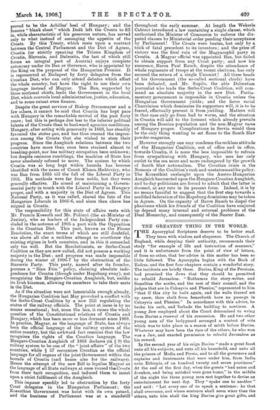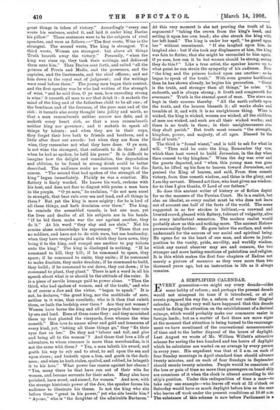THE GREATEST THING IN THE WORLD.
THE Apocryphal Scriptures deserve to be better read. They teem with wisdom and eloquence. The Church of England, while denying their authority, recommends their study "for example of life and instruction of manners," and it is unfortunate from the point of view of letters, if from no other, that her advice in this matter has been so little followed. The Apocrypha begins with the Book of Esdras, and the first four chapters contain a wonderful story. The incidents are briefly these. Darius, King of the Persians, had promised the Jews that they should be permitted to rebuild Jerusalem. " Rathumus the story-writer, and Semellius the scribe, and the rest of their council, and the judges that are in Celosyria and Phenice," represented to him "that if this city be built again, and the walls thereof set up anew, thou shalt from henceforth have no passage in Celosyria and Phenice." In accordance with this advice, he broke his oath, and 'forbade the building to continue. A young Jew employed about the Court determined to wring from Darius a renewal of his concession. He and two other young men of the bodyguard arranged a contest of wits which was to take place in a season of mirth before Darius. Whatever may have been the race of the others, be who won was a Jew, and exacted permission to rebuild Jerusalem as his reward.
In the second year of his reign Darius " made a great feast unto all his subjects, and unto all his household, and unto all the princes of Media and Persia, and to all the governors and captains and lieutenants that were under him, from India unto Ethiopia, of an hundred twenty and seven provinces." At the end of the first day, when the guests " had eaten and drunken, and being satisfied were gone home," in the middle of the night the three young men met together to devise an entertainment for next day. They " spake one to another " and said: " Let every one of us speak a sentence : he that shall overcome, and whose sentence shall seem wiser than the others, unto him shall the king Darius give great gifts, and
great things in token of victory." Accordingly "every one wrote his sentence, sealed it, and laid it under king Darius his pillow." These sentences were to be the subjects of rival speeches, and were as follows :—" The first wrote, Wine is the strongest. The second wrote, The king is strongest. Tl e third wrote, Women are strongest : but above all things Truth beareth away the victory." Presently, " when the king was risen up, they took their writings, and delivered them unto him." Then Darius sent forth, and called " all the princes of Persia and Media, and the governors, and the captains, and the lieutenants, and the chief officers ; and sat him down in the royal seat of judgment; and the writings were read before them." The young men began their contest, and the first speaker was he who had written of the strength of wine, " and he said thus, 0 ye men, how exceeding strong is wine ! it causeth all men to err that drink it : it maketh the mind of the king and of the fatherless child to be all one ; of the bondman and of the freeman, of the poor man and of the rich : it turneth also every thought into jollity and mirth, so that a man remembereth neither sorrow nor debt, and it maketh every heart rich, so that a man remembereth neither king nor governor ; and it maketh to speak all things by talents : and when they are in their cups, they forget their love both to friends and brethren, and a little after draw out swords : but when they are from the wine, they remember not what they have done. 0 ye men, is not wine the strongest, that enforceth to do thus ? And when he had so spoken, he held his peace." It is difficult to imagine how the delight and consolation, the degradation and oblivion, to be found in strong drink could he better described. The audience make no comment upon the dis- course. " The second that had spoken of the strength of the king" began immediately. Plainly he was a courtier. His flattery is finely worded. He knows his work, reckons with his host, and does not fear to disgust with praise a man born in the purple. "O ye men," he exclaims, "do not men excel in strength, that bear rule over sea and land, and all things in them ? But yet the king is more mighty : for he is lord of all these things, and hath dominion over them." The king, be reminds the assembled vassals, is but one man, yet the lives and deaths of all his subjects are in his hands. "If he bid them make war the one against another, they do it." At his word " they slay and are slain." Not his armies alone acknowledge his supremacy. "Those that are no soldiers, and have not to do with wars, but use husbandry, when they have reaped again that which they have sown, they bring it to the king, and compel one another to pay tribute unto the king." The king is disobeyed in nothing. " If he command to kill, they kill; if he command to spare, they spare; if he command to smite, they smite ; if he command to make desolate, they make desolate ; if he command to build, they build ; if he command to cut down, they cut down ; if he command to plant, they plant." There is not a word in all his speech about what is or should be the attitude of the ruler. It is a piece of servile homage paid to power alone. " Then the third, who had spoken of women, and of the truth," and who is of course a Jew and the victor, " began to speak." It is not, he declares, "the great king, nor the multitude of men, neither is it wine, that exoelleth; who is it then that ruleth them, or bath the lordship over them ? Are they not women ? Women have borne the king and all the people that bear rule by sea and land. Even of them came they : and they nourished them up that planted the vineyards, from whence the wine cometh." Men love to amass silver and gold and treasures of every kind, yet, "letting all those things go," they "fix their eyes fast on her." Do they not "labour and toil, and give and bring all to the woman" ? And those that love a life of adventure, to whom romance is more than merchandise, is it not the same with them ? " Yea, a man taketh his sword, and goeth his way to rob and to steal, to sail upon the sea and upon rivers ; and looketh upon a lion, and goeth in the dark- ness ; and when he bath stolen, spoiled, and robbed, he bringeth it to his love." What power has reason against her charm ? " Yea, many there be that have run out of their wits for women, and become servants for their sakes. Many also have perished, have erred, and sinned, for women." And now, with the strange histrionic power of the Jew, the speaker forces his audience to illustrate his theme. Is not the king who sits before them ".great in his power," yet who sits beside him ? " Apanae," who is " the daughter of the admirable Bartacus."
At this very moment is she not proving the truth of his argument ? " taking the crown from the king's head, and setting it upon her own head ; she also struck the king with her left hand." The king is under her spell, "he gazed upon her " without resentment. " If she laughed upon him, he laughed also : but if she took any displeasure at him, the king was fain to flatter, that she might be reconciled to him again. 0 ye men, how can it be but women should be strong, seeing they do this ?" Like a true artist, the speaker knows up to what point he can strain the sympathy of his audience. Now " the king and the princes looked upon one another : so he began to speak of the truth." With even greater hardihood than he has shown already, he begins his peroration. " Great is the truth, and stronger than all things," he cries. "It endureth, and is always strong ; it liveth and conquereth for evermore." Truth is the eternal quest of man. The stars are kept in their courses thereby. "All the earth calleth upon the truth, and the heaven blesseth it : all works shake and tremble at it, and with it is no unrighteous thing. Wine is wicked, the king is wicked, women are wicked, all the children of men are wicked, and such are all their wicked works; and there is no truth in them ; in their unrighteousness also they shall perish." But truth must remain "the strength, kingdom, power, and majesty, of all ages. Blessed be the God of truth."
The third is "found wisest," and is told to ask for what he will. " Then said he unto the king, Remember thy vow, which thou halt vowed to build Jerusalem, in the day when thou comest to thy kingdom." When the day was over and the guests departed, and when this young man was gone forth, he lifted up his face to heaven toward Jerusalem, and praised the King of heaven, and said, From thee cometh victory, from thee cometh wisdom, and thine is the glory, and I am thy servant. Blessed art thou, who halt given me wisdom: for to thee I give thanks, 0 Lord of our fathers."
So does this ancient writer of history or of fiction depict for us the manners of the Persian Court. He is a realist, but also an idealist, as every realist must be who does not leave out of account one half of the facts of the world. The scene suggested in so few strokes is brilliant,—a crowned and liveried crowd, pleased with flattery, tolerant of vulgarity, alive to every intellectual sensation. The modern realist would probably show us this and nothing more. The ancient Hebrew pursues reality further. He goes below the surface, and seeks underneath for the sources of our social and spiritual being. He opens for us the heart of one man, and shows in juxta- position to the vanity, pride, servility, and worldly wisdom, which any casual observer may see and censure, the two stronger and more lasting emotions of patriotism and religion. It is this which makes the first four chapters of Eadras not merely a picture of manners as they were more than two thousand years ago, but an instruction in life as it always remains.











































 Previous page
Previous page